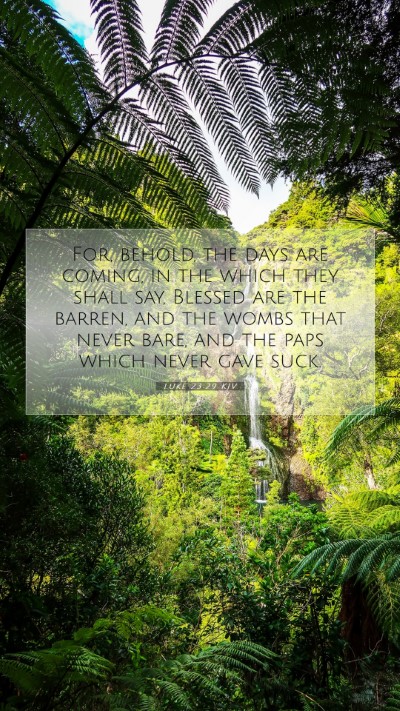Understanding Luke 23:29
Luke 23:29 states:
"For behold, the days are coming when they will say, 'Blessed are the barren, and the wombs that never bore, and the breasts that never nursed!'"
This verse captures a poignant moment in the account of Jesus' crucifixion, expressing an enigmatic blessing for those who are childless. Here, we will explore various aspects of this verse through the lens of public domain commentaries, offering rich insights into its meaning and implications.
Bible Verse Explanation
In this section, we will delve into the interpretations provided by key commentators to expand our understanding of this passage.
- Matthew Henry: Henry suggests that this statement illustrates the utter devastation and sorrow that will accompany the fall of Jerusalem, highlighting the extreme circumstances of those who will witness such tragedies. In a context of impending judgment, the blessedness of barren women is juxtaposed with the calamity befalling those with children.
- Albert Barnes: Barnes emphasizes the prophetic nature of this verse, suggesting that it points to a future time when childbearing will be a source of suffering rather than joy. It suggests a complete reversal of social norms, where those who traditionally experience happiness and fulfillment through motherhood will instead be pitied.
- Adam Clarke: Clarke notes the social and cultural connotations of barrenness in ancient Israel, often viewed with disdain. Here, the statement highlights an ironic blessing that transforms societal values under dire circumstances, implying that in times of great distress, those without children will avoid the sorrow associated with loss.
Biblical Exegesis
This verse stands out for its stark contrast to traditional Jewish values regarding fertility and motherhood. Let's explore its relevance through a historical and theological lens:
- Historical Context: The lamentation over barren women is indicative of a time of great loss. Such public mourning reflects the cultural significance of children as a blessing from God, and their impending suffering highlights the tragic fate awaiting Jerusalem.
- Theological Implications: The passage sheds light on God's looming judgment against a rebellious nation, using irony to convey deeper truths about suffering, sacrifice, and divine retribution.
Application of Luke 23:29
For contemporary readers, Luke 23:29 invites reflection on the themes of loss, suffering, and the paradoxes of blessing during times of crisis. Key takeaways include:
- Reflection on Suffering: This verse compels us to consider how we respond to suffering and injustice in our own lives. It challenges us to find hope and meaning even when circumstances feel overwhelmingly bleak.
- Understanding Modern Context: The themes of this verse resonate within modern contexts of loss and grief, reminding believers of the importance of empathy and support for those who are suffering.
Cross References
This insightful verse can be further understood by considering the following biblical passages:
- Isaiah 54:1 - “Sing, O barren, you who have not borne!” - This verse further emphasizes the metaphorical significance of barrenness.
- Jeremiah 16:2 - “You shall not take a wife, nor shall you have sons or daughters...” - Reflects on the suffering and judgment impending on the nation at that time.
- Matthew 24:19 - “But woe to those who are pregnant and to those who are nursing babies...” - This verse elucidates the idea of the burden of motherhood during times of tribulation.
Conclusion
Luke 23:29 serves as a profound commentary on societal values in light of suffering and God's judgment. Through the insights provided by various commentators, we observe a complex interplay of divine truth and human experience. Understanding such verses is crucial for meaningful Bible study and application in our daily lives.
This analysis aids in our Bible verse understanding, providing crucial insights for anyone engaging in Bible study groups, utilizing Bible study tools, or seeking Bible study lessons on profound scripture. It illuminates the meaning of Bible verses within a contemporary framework, encouraging deeper Bible verse interpretations and enrichening our spiritual journeys.
As we reflect on this verse, let us approach it with humility and a desire to grow in our understanding of Scripture.


